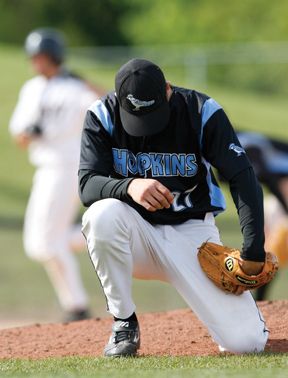Clade longa, vita brevis

Or, the maddening persistence of defeat
Esteemed reader, Dr Essai has been traveling, which accounts for the paucity of missives lately. He now has resumed residence in his library tower in the wilds of Maryland and is at work on an essay about artificial intelligence, working title “AI Has Come for the Mediocre and Resistance is Futile.”
Meanwhile, with late spring has come varsity collegiate athletes competing for national championships. The doctor’s erstwhile employer, Johns Hopkins University, excels at lacrosse and baseball, which are spring sports (for non-American readers). This year, Hopkins’s men’s lacrosse team reached the national quarterfinals and baseball ranks first in the nation as of this scribbling.
Among elite athletes and elite programs that contend for national titles, every team but one ends its season with a crushing defeat. One champion celebrates deliriously and everyone else goes home gutted. On successive days in 2008, Johns Hopkins lost national championship games in two spring sports and the doctor wrote a reflection on the way defeat and mistakes stick with us long after triumph has dimmed. Here is that piece, with a bit of revision and a postscript. As always, thank you for reading.
When I was a senior at Ohio University, I dropped a touchdown pass. Decades later, my memory of the play is strikingly vivid. The quarterback had thrown a perfect spiral, low and away where no defender could knock it down. I was in perfect position, squared to the ball, sliding onto my left hip, my hands exactly where they needed to be just above the turf of the end zone. I can still feel the leather strike my palms, the laces sting my fingers, and the ball somehow slide through my hands and bounce away. Incomplete. We went on to lose the game. That touchdown would have won it.
It is a source of wonder to me how often that scene has played in my mind with high-definition clarity. Mind you, I did not drop the pass in the Rose Bowl, or in a varsity intercollegiate game before 40,000 groaning spectators. This was an intramural game. Not even my girlfriend was there. Yet the memory persists long past any recall of touchdown passes that I caught. As a boy, I was a two-time all-star in youth baseball. I had my share of good moments. But the only two plays I can remember? One was when I tried to stretch a triple into a home run and was thrown out at the plate. The other was a dropped pop-up in my first all-star game. (I also remember the all-star team’s coach snarling, “Nice catch,” which is not what an embarrassed 11-year-old needed to hear from an adult. This may be when I began to have a problem with authority.)
A cold fact of life for any athlete (and probably everyone else) is that failure possesses a cruel persistence. I have read repeatedly that great players have short memories, which lets them miss three straight shots, then take a fourth with full confidence that this time they’ll make it. But I’d bet a week’s pay that LeBron James and Megan Rapinoe and Aaron Judge can list every error and stumble and blown shot of their lives. Their lists will be far shorter than anyone else’s, but they will remember what is on them.

I was reminded of all this by a photograph on the front page of the Baltimore Sun’s May 28, 2008 sports section. In the picture, shot by Associated Press photographer Dan Powers, Johns Hopkins pitcher Matt Wiegand kneels, head down, every aspect of his posture expressing anguish because he has just walked in the tying run in the final game of baseball’s College World Series. Next he walked in the winning run. One bad pitch, one national championship gone for good. When I picked up that morning’s paper, I already knew the final score—Trinity College 4, Johns Hopkins 3. But when I saw that picture, my heart sank. Individual players don’t lose games. Teams lose games. But at that instant no one could have convinced Wiegand that he had not just thrown away a national championship.
This was but one of two national titles lost by Hopkins teams on successive days. A bit more than 24 hours earlier, Hopkins’s men’s lacrosse had lost the Division I championship to Syracuse, 13-10. That Hopkins played for national crowns two straight days in May was a great accomplishment for the university’s athletics program. The lacrosse senior class of 2008 had had a brilliant run, reaching the NCAA championship game three out of four years and winning it twice. They displayed guts, character, and extraordinary skill and desire. The baseball team was their match for courage, resilience, and sheer ability to play the game. For the national championship, they had to beat twice a Trinity team that had not lost all year—they were 43-0 when they first faced Hopkins. The Jays won that first game and came within a single strike of possibly taking the second and the national crown. No Hopkins baseball team has ever accomplished more. But what will linger for the players is not how high they soared but how they lost.
If you understand baseball, you know that in that last inning, Matt Wiegand, who was only a sophomore, battled fiercely and made some great pitches. With the tying run on third and the winning run on second, he struck out Thomas DiBendetto, a .342 hitter. With the score tied and bases loaded, he faced a full count on senior Guy Gugliettino. Knowing that one ball out of the strike zone would mean losing the national championship, Wiegand forced Gugliettino to foul off six straight pitches. That means six times, under the most intense pressure imaginable, Wiegand did exactly what he was supposed to do. He put the ball where Gugliettino dared not let it go for fear of a called third strike, but couldn’t get his bat full on it for a game-winning hit either. Wiegand was superb. But Gugliettino was better by the smallest of measures, and the next pitch left Wiegand slumped in despair. He deserves to remember those six great pitches. But the mind does not work that way. He will remember the seventh.
The day before, I was in Boston for the lacrosse championship. After the game, I waited outside the stadium with disappointed fans and saddened parents for the team’s arrival. Several of the Jays’ starting players had performed poorly in the most important game of the year. Nobody will ever know why. It just happens. One of them was senior Stephen Peyser, a smart, strong, skillful player whom I’ve known for a couple of years as a thoroughly pleasant young man. I had just watched him play perhaps the worst game of his Hopkins career, and when he climbed off the team bus and walked toward his father he broke down crying. Michael Peyser, Stephen’s dad, could be a tough customer, critical and unsparing in his post-game comments. I watched to see what he would do. As Stephen approached him, Michael did the absolutely right thing. He took his distraught son in his arms and just held on. It was a champion’s play.
Mistakes and losses in the games we play stay with us for life. Who knows why? Maybe it is to ground us in the deep knowledge that triumph is rare and fleeting, and that for almost every one of us, a fundamental measure of our lives will be the grace and perseverance with which we face pain and disappointment. If that last pitch out of the strike zone is the worst thing ever to befall Matt Wiegand, he will be a rare and fortunate man. At the end of the day, it was still only a baseball game. But I hope that after he finally stood up and walked off the field, he found someone who loves him, and that person hugged him for a long, long time.
Postscript: After this essay appeared in Johns Hopkins Magazine, Dr Essai received a kind note from Matt Wiegand’s mother, thanking him and saying that she had, indeed, hugged her son for a long time. The doctor could not determine Mr. Wiegand’s current whereabouts, but Stephen Peyser went on the play professional lacrosss and is now head of US cash equity trading at Bank of America Merrill Lynch.
Member discussion